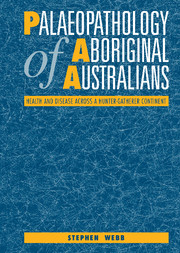Book contents
- Frontmatter
- Contents
- List of illustrations
- List of tables
- Acknowledgements
- 1 Introduction
- 2 Australian palaeopathology, survey methods, samples and ethnohistoric sources
- 3 Upper Pleistocene pathology of Sunda and Sahul: some possibilities
- 4 Pathology in late Pleistocene and early Holocene Australian hominids
- 5 Stress
- 6 Infectious disease
- 7 Osteoarthritis
- 8 Trauma
- 9 Neoplastic disease
- 10 Congenital malformations
- 11 Motupore: the palaeopathology of a prehistoric New Guinea island community
- 12 The old and the new: Australia's changing patterns of health
- References
- Index
5 - Stress
Published online by Cambridge University Press: 21 May 2010
- Frontmatter
- Contents
- List of illustrations
- List of tables
- Acknowledgements
- 1 Introduction
- 2 Australian palaeopathology, survey methods, samples and ethnohistoric sources
- 3 Upper Pleistocene pathology of Sunda and Sahul: some possibilities
- 4 Pathology in late Pleistocene and early Holocene Australian hominids
- 5 Stress
- 6 Infectious disease
- 7 Osteoarthritis
- 8 Trauma
- 9 Neoplastic disease
- 10 Congenital malformations
- 11 Motupore: the palaeopathology of a prehistoric New Guinea island community
- 12 The old and the new: Australia's changing patterns of health
- References
- Index
Summary
General introduction
One of the few tenets of palaeopathological and palaeoepidemiological study is that there is an intimate relationship between the lifestyle of humans and the frequency and types of disease from which they suffer. That relationship has been demonstrated repeatedly in numerous studies of ancient and more recent skeletal populations from many parts of the world. They have shown, for example, that there is an increase in the frequency of certain types of stress and infectious disease with socio-economic, cultural and demographic change. This association has provided archaeologists with an important interpretive tool for unravelling the time at which socio-economic as well as demographic changes in ancient populations took place. Moreover, palaeopathology has helped to identify when some hunter-gatherer groups began to lead a more sedentary existence, that transitional stage before taking up farming and developing permanent towns and villages. This has been a particularly difficult stage of cultural development to detect in the archaeology using more traditional methods of investigation. Of equal importance is the fact that this same research has enabled us to study the temporal and spatial origin of disease. In turn we have gained a better understanding of the ecology of certain pathogens and the environmental changes which affect them. In this way palaeopathology and palaeoepidemiology have contributed enormously to our understanding of present-day disease.
- Type
- Chapter
- Information
- Palaeopathology of Aboriginal AustraliansHealth and Disease across a Hunter-Gatherer Continent, pp. 89 - 124Publisher: Cambridge University PressPrint publication year: 1995



